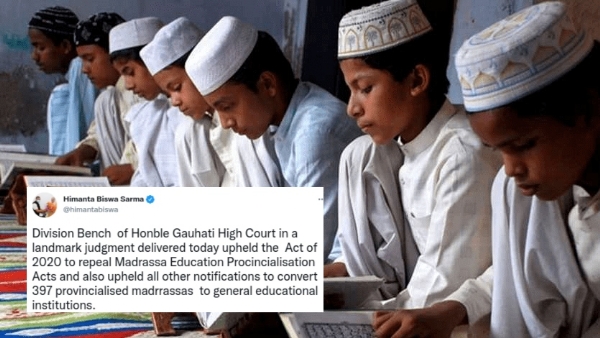Gauhati High Court upholds Assam govt’s decision to convert state-run madrassas to regular schools
05 Feb 2022 15:39:40
Guwahati, Feb 5: In a major development, the Gauhati high court upheld the law passed by the Assam assembly to close all state-funded madrassas and convert them as schools for general education. Notably, the Assam governor had given his assent to the law exactly a year ago.

Taking to Twitter, Assam Chief Minister terming it as "landmark judgement" welcomed the decision. "Division Bench of Honble Gauhati High Court in a landmark judgment delivered today upheld the Act of 2020 to repeal Madrassa Education Procincialisation Acts and also upheld all other notifications to convert 397 provincialised madrrassas to general educational institutions," he tweeted.
Around 900 private madrassas, community madrasas or the “Qawmi Madrasas” and “Maktabs”, almost all of which are run by Jamiat Ulama and not the government, will, however, remain functional.
A division bench comprising Chief Justice Sudhanshu Dhulia and Justice Soumitra Saikia, while dismissing the writ petition filed by 13 petitioners who challenged The Assam Repealing Act 2020 passed by the assembly on December 30, 2020 said, "The executive orders which are under challenge before us have not dispensed with the services of teachers who were so far imparting education in the Madrasas. They will now be required to teach Arabic or may even be trained for teaching other subjects."
Also Read: Assam passes Bill to turn state-run Madrassas into regular schools
Affirming that secularism means treating everyone equally, the court observed, "We live in a democracy and under a Constitution where all citizens are equal before the law. Therefore, preference given by the state to any one religion, in a multi-religious society like ours, negates the principle of Articles 14 and 15 of the Constitution of India. It is thus the secular nature of the State which mandates that no religious instruction shall be provided in any educational institution wholly maintained out of State funds [Article 28(1)]."
Under the Assam Repealing Act there are two laws — Assam Madrassa Education (Provincialisation ) Act 1995 and the Assam Madrassa Education (Provincialisation of services of employees and re-organisation of Madrassa Educational Institutions) Act 2018 — redundant and paved the way for converting these state-funded madrassas into general upper primary, high school and higher secondary schools. The court rejected the argument made by the petitioners’s counsel senior advocate Sanjay Hegde that the Repealing Act and the subsequent government orders violated the fundamental rights of the petitioners under Articles 25, 26, 28 and 30 of the Constitution of India.
Also Read: Assam Govt tables bill to derecognize Islamic Madrassas
In December, 2020, abolishing all state-run Madrassas and transforming them into regular schools, the Assam government has passed the bill called the Assam Repealing Bill, 2020. This bill came into effect from April 1, 2021. According to the survey conducted by a Guwahati University Professor, it was founded that the parents and guardians of most of the students of Madrassas are not aware that the children are not taught regular subjects in Madrassas.
Rather they have imparted lessons of theology. Therefore, it is essential to convert the Madrassas into regular schools that provide primary and secondary education. Madrassas are educational institutions that teach the religion of Islam and thus imparts only religious education. The first network of Madrassas was built in Iran, Khorasan, and Mesopotamia by Nizam-al-Mulk. The Madrassas mainly teach the holy book of Muslims; 'The Holy Quran'.
Also Read: Saudi Arabia bans Tablighi Jamaat, links them with terrorists
In 2015, the Maharashtra Government had faced wide criticism for derecognizing Madrassas. The Maharashtra State Govt too had brought up the same reason that Madrassas provide the students' education merely based on religion without imparting formal education of fundamental subjects such as Maths, English, and Science.